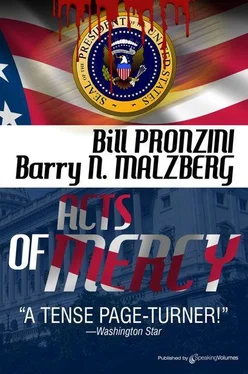Bill Pronzini - Acts of Mercy
Здесь есть возможность читать онлайн «Bill Pronzini - Acts of Mercy» весь текст электронной книги совершенно бесплатно (целиком полную версию без сокращений). В некоторых случаях можно слушать аудио, скачать через торрент в формате fb2 и присутствует краткое содержание. Жанр: Триллер, на английском языке. Описание произведения, (предисловие) а так же отзывы посетителей доступны на портале библиотеки ЛибКат.
- Название:Acts of Mercy
- Автор:
- Жанр:
- Год:неизвестен
- ISBN:нет данных
- Рейтинг книги:4 / 5. Голосов: 1
-
Избранное:Добавить в избранное
- Отзывы:
-
Ваша оценка:
- 80
- 1
- 2
- 3
- 4
- 5
Acts of Mercy: краткое содержание, описание и аннотация
Предлагаем к чтению аннотацию, описание, краткое содержание или предисловие (зависит от того, что написал сам автор книги «Acts of Mercy»). Если вы не нашли необходимую информацию о книге — напишите в комментариях, мы постараемся отыскать её.
Acts of Mercy — читать онлайн бесплатно полную книгу (весь текст) целиком
Ниже представлен текст книги, разбитый по страницам. Система сохранения места последней прочитанной страницы, позволяет с удобством читать онлайн бесплатно книгу «Acts of Mercy», без необходимости каждый раз заново искать на чём Вы остановились. Поставьте закладку, и сможете в любой момент перейти на страницу, на которой закончили чтение.
Интервал:
Закладка:
She flinched as if he had struck her, stood quickly and came to him and gripped his arms. He wanted to pull away from her, but her eyes held him as much as her hands. “I’m not turning against you,” she said. “Don’t ever say that. Don’t ever think it.”
He could feel the anger starting to give way; as so many times before, the nearness of her, her touch, was a kind of emotional tranquilizer. “I’m sorry, Claire, I didn’t mean that. But I’ve taken all the pushing and shoving I can stand. My mind is made up; I need support, not dissent.”
“You won’t change it even for me?”
“I won’t because I can’t. Now I don’t want to talk about it anymore.”
“We have to talk about it. We… have to.”
“No,” Augustine said. The anger in him was completely gone now; he felt nothing but weariness. “You asked me not to doubt you, you say you only want what’s best for me-all right, then tell me you’ll stand by my decision.”
“Nicholas…”
“Will you stand by me?” he said.
Her throat worked as if she were swallowing something painful. Her eyes moved on his face, gentle, stroking, and he knew again the illusion of being absorbed in their depths. She said, “Do you really have to ask a question like that?”
Impulsively, almost fiercely, he drew her to him, held her in a tight embrace. Felt the solid unyielding strength of her flow into him and cement his own strength. “God, how I need you,” he said against the softness of her hair.
“I know,” she said. “I know. I know.”
Bill Pronzini Barry N. Malzberg
Acts of Mercy
Thirteen
We have gathered more evidence now against the man we believe to be the leader of the conspiracy against Nicholas Augustine-almost but not quite enough evidence to fully convict him in our eyes. We cannot afford to wait too long, and yet we must continue to be careful and cunning. The last necessary proof will come to us shortly, we are growing more and more certain of that; it can only be a matter of a day or two.
The clock ticks slowly, but it ticks inexorably too: ticks away the minutes of life that are left to this viper in the President’s bosom.
Fourteen
The Oval Office, ten-thirty Thursday morning.
Christopher Justice sat in one of the chairs near the fireplace, listening as the President gave an informal interview to senior correspondents from Time, the Washington Post, and Commentary. The reporters-two men and a woman-were grouped in a loose semicircle before the President’s desk; the only other person in the room was Austin Briggs, who occupied a chair near Justice’s.
The interview had been going well. Augustine was garrulous, polite, forceful; as a result the reporters, who were clearly hostile at first, were now responding more favorably to his comments on the nature of his office, on contemporary politics, on his plans for a second term. Briggs, though, seemed nervous and kept lighting one cigarette from the butt of another. Justice wondered again why the President had asked the press secretary to sit in. For that matter, he did not know why he himself had been asked to sit in, except that Augustine seemed to want him nearby more and more of late.
The reporters’ questions had gotten around now to Israel, as Justice had expected they would. The thin, attractive woman from Time was saying, “Mr. President, do you have anything further to add to your recent statement on Israel?”
The President smiled indulgently. “Only that those remarks of mine were meant as a comment on American foreign policy in general-a philosophical comment, not a statement of intention. In no way were they meant to demean the Israelis, as some of your colleagues have presumed.”
The studious-looking man from Commentary leaned forward. Of the three reporters, he had been the most hostile in the beginning; Justice knew that that was because Commentary was an intellectual quarterly circulated almost exclusively among members of the Jewish community. “Have you conveyed that explanation to Prime Minister Stein, Mr. President?” he asked.
“Through Mr. Oberdorfer, yes, certainly.”
“But reports from Tel Aviv state that the Prime Minister is demanding an immediate retraction. Apparently he was not satisfied with a simple clarification. Are we to understand, then, that you have no intention of acceding to his demand?”
“That is correct. But only because I see no purpose in retracting a misunderstood statement. It would only compound the misunderstanding, if you see what I mean-give credence to it.”
“What do you intend to do, sir, to reestablish optimum relations with Israel?”
“Well, if Mr. Oberdorfer is unable to handle the situation to our mutual satisfaction, I will ask Prime Minister Stein to meet with me here in Washington, both privately and publicly. That should eliminate any regrettably unpleasant feelings on both sides, and help clarify our positions as friends and allies.”
The man from Commentary seemed satisfied, as did the other two reporters. After a moment the short, balding man from the Washington Post asked, “Would you care to elaborate, Mr. President, on your foreign-policy views?”
“Yes, I would,” Augustine said. He selected one of his pipes, rubbed the bowl against his nose to add oil to the surface, and then buffed it vigorously with one palm. “Since the end of World War Two, our foreign policy has become the center of ideological attention; but the fact is, for many administrations it was also a means of distracting the populace from domestic problems which were not being solved. The Cold War, the arms race, escalating nuclear capabilities, the Domino Theory-all of these diverted attention from the more serious issues of racial inequality, poverty, unemployment, and so on. In short there has been a two-party consensus on foreign policy which amounts to a tacit agreement not to challenge each other on domestic affairs.”
“That’s an interesting concept, sir,” the woman from Time said, “but one I find difficult to accept. Surely you don’t mean that foreign policy has been overemphasized as a deliberate means of protecting a negative domestic status quo?”
“Not at all. I was merely pointing out that recent administrations have found domestic difficulties so insurmountable that they have concentrated instead on foreign affairs.”
There were more questions, more responses on the subject, each of them increasingly complicated and philosophical. Justice had difficulty understanding some of them; political science was a topic which sometimes bewildered him.
The discussion shifted finally to Vice-President Conroy’s Western states travails. Not only had he had problems in Montana and Nevada, but yesterday he had been traveling in a motorcade in Phoenix when a group of Navaho dissidents approached his open car and spat on him. A photograph showing the Vice-President cowering inside had appeared on the front pages of the Washington papers this morning, and more than one columnist had not neglected the opportunity to match Conroy’s posture figuratively with that of the President. After the incident the Vice-President had gone into seclusion at his hotel and had not as yet issued a public statement.
“Mr. President,” the man from the Post said, “what is your reaction to the incident in Phoenix?”
“I’m appalled, of course,” Augustine said.
The reporter from Commentary asked, “Do you feel that the Vice-President was correct in not issuing a statement after the incident?”
“I see no reason why he should have. There was nothing for him to say, really.”
“The photograph in this morning’s papers was somewhat unflattering, to say the least. Do you question Mr. Conroy’s public reaction when he was spat upon?”
Читать дальшеИнтервал:
Закладка:
Похожие книги на «Acts of Mercy»
Представляем Вашему вниманию похожие книги на «Acts of Mercy» списком для выбора. Мы отобрали схожую по названию и смыслу литературу в надежде предоставить читателям больше вариантов отыскать новые, интересные, ещё непрочитанные произведения.
Обсуждение, отзывы о книге «Acts of Mercy» и просто собственные мнения читателей. Оставьте ваши комментарии, напишите, что Вы думаете о произведении, его смысле или главных героях. Укажите что конкретно понравилось, а что нет, и почему Вы так считаете.












